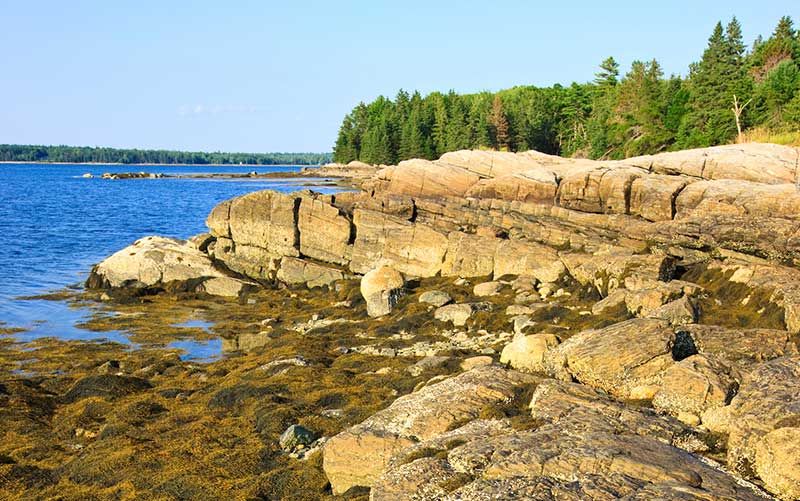
Photo: Ecophotography
When you walk around the shores of Downeast Maine at low tide, you’re sure to see rockweed covering much of the coastline. This critical habitat for shellfish, seabirds, lobsters, and crabs is a vital piece of Maine’s ecosystem – but is it really a plant, or rather, is it a fish? This is the central question in a case argued last week before Maine’s highest court.
On one side are rockweed harvesters, who are pushing the court to interpret a centuries-old law in a way that lumps rockweed together with mussels, oysters, and other marine species. This would allow harvesters to take the rockweed straight from the intertidal zone without any permission or interaction with coastal landowners.
On the other side – a position supported by CLF – are the landowners themselves, who believe the rockweed growing in the intertidal zone is part of their property and its harvesting requires their consent. They point out that the relationship between rockweed and the rocks to which it’s attached is similar to that of moss on trees on land, and therefore, it should rightly be classified as a plant and governed by traditional property law.
Of course, granting landowners the rights to the rockweed on their land does not preclude that rockweed from being managed in a way that protects ecosystems and preserves natural resources. In much the same way we work with property owners to sustainably manage woodlands, sand and gravel, and other resources on their property, CLF’s brief in this case notes that collaboration among property owners, rockweed harvesters, and Maine’s Department of Marine Resources is the best path forward.
By working together to identify the most appropriate areas along to coast to harvest and the best harvesting methods, owners’ rights and ecological conservation can work as complementary forces, a point highlighted in a recent Working Waterfront op-ed.
Rockweed recognized as critical fish habitat
CLF was gratified that members of the court last week raised the importance of rockweed as critical habitat for fish and recognized the impacts our changing climate is having on the ocean, two points highlighted in CLF’s friend-of-the-court brief. The ability of fish to thrive is critical for our coastal fisheries – and ultimately, we cannot allow one coastal industry to pose harm to another at a time when we need to strengthen and fortify our coastal economy against the impacts of climate change.
Rockweed harvesting is a growing venture in Maine, and it must be managed in concert with current economic and environmental needs to ensure long-term sustainability. Maine’s Supreme Judicial Court has struggled in the past with the colonial-era law that defines the scope of the public’s right to “fish, fowl, and navigate” in Maine’s waters, and this case is no different. A decision could take several months, and CLF will be closely tracking the outcome to ensure the rocky coast of Maine continues to contribute to our thriving marine ecosystem.



